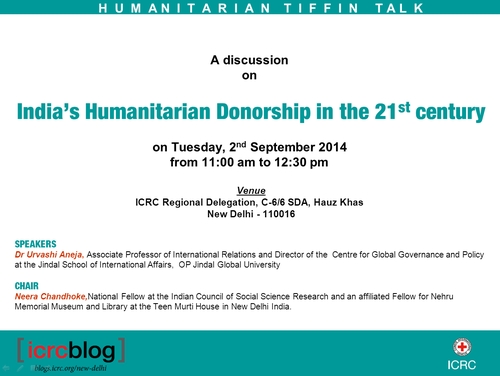The ICRC regional delegation in New Delhi has the pleasure of announcing the first edition of Tiffin Talk, a series of discussions. The theme of this talk is India’s Humanitarian Donorship in the 21st Century. The event will be held on 2 September from 11am to 12.30pm at the ICRC office in Safdarjung Development Area, Hauz Khas, New Delhi. The first Tiffin Talk will feature an address by Professor Urvashi Taneja, an expert in the field of international relations, and will see Neera Chandhoke, national fellow at the Indian Council of Social Science Research, in the chair.
About the theme:
India, from being an aid recipient, is fast changing its credentials into a donor nation. Since 2005, the old rules of ‘give-and-take’ have crumbled in light of new alignments in a new world. Many countries in the neighbourhood are looking up to India to set a positive precedent for them. The Economist made a pointed observation about India’s transformation into a donor country, detailing how India proposes to disburse almost USD 11 billion in aid over the next five years.
India has spent more than USD 2 billion in Afghanistan on various capacity- and institution-building projects. According to available statistics, India disbursed USD 1 billion for overseas projects in 2007. In 2011, the country ranked as the second largest emerging donor after China with overseas disbursements of an estimated USD 1.5 billion. In the meantime, foreign aid projects managed by the Ministry of External Affairs (MEA) more than doubled from USD 300 million in 2007 to over USD 700 million in 2012.
It is clear that in the 21st century India is writing new rules and, in the process, is also actively bidding for a permanent membership in the United Nations Security Council (UNSC).
We have Professor Urvashi Taneja, who is writing a book and doing indepth research on India’s humanitarian donorship mapping the emergence of India as 21st century player in field of humanitarian assistance. She will speak on the setup and recent changes in India’s foreign aid infrastructure and analyze the country’s integration in the global humanitarian system. She will also give a detailed account of India’s humanitarian portfolio and its development as a donor country in the past decade.
About the Speaker
Dr. Urvashi Aneja is Associate Professor of International Relations and Director of the Centre for Global Governance and Policy at the Jindal School of International Affairs, OP Jindal Global University. She received her MPhil and doctorate in international relations from the University of Oxford. Urvashi’s research focuses on the international politics of humanitarianism. Her doctoral research examined the factors shaping the policies and practices of international humanitarian NGOs in political emergencies, and is the basis for her forthcoming book Contesting the Humanitarian Regime in Political Emergencies: INGO policies and practices in Sri Lanka and Afghanistan, 1990-2010. Urvashi is also currently leading a project on South-South Humanitarianism. She has recently published pieces on India’s humanitarian donorship in the 21st century. She is also a member of the forty person task force appointed by UN-OCHA to prepare for the World Humanitarian Summit, 2016.
About the Chairperson
Neera Chandhoke is currently a National Fellow at the Indian Council of Social Science Research and an affiliated Fellow for Nehru Memorial Museum and Library at the Teen Murti House in New Delhi India. In August 2012, Neera retired as professor of political science and director of the Developing Countries Research Centre at the University of Delhi after 27 years of service. She has written and published widely on civil society, secularism, democracy, affirmative action, representation, social and economic rights, and on freedom from poverty as a human right. She is the author of State and Civil Society: Explorations in Political Theory Delhi (Sage, 1995); Beyond Secularism: The Rights of Religious Minorities Delhi (OUP, 1999) and The Conceits of Civil Society Delhi (OUP, 2003). Neera was an international visiting fellow in London School of Economics until 2007.
ICRC New Delhi


